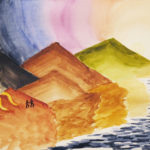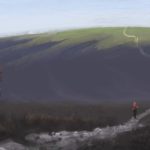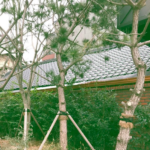Not afraid of the ruins is a new collaborative writing project for utopian dreamers, other-worldly explorers and psychonautic adventurers, scholars, activists, students, and critics. Over the past year, we’ve collected stories and critical essays, reviews and poetry—all dedicated to science fiction, climate fiction, and utopian imaginings. The goal of this section is to regularly showcase new, original, creative and critical reflections to foster intimate and productive conversations across the intellectual and creative arts.
The fertile ground between science fiction and social/environmental justice has long been an arena for speculation and exploration by academics, activists, and creative writers. From the academy to the field and beyond, the works of science fiction writers such as Octavia E. Butler, Ursula Le Guin and Margaret Atwood (among many, many others) have presented unique corollaries to the diverse worlds and experiences we encounter in political ecology and social/environmental justice research and activism. Our goal with this project is to create a space explicitly open to exploring such convergences, a space that is neither formally academic nor wholly creative fiction, but instead, in the true spirit of Ursula Le Guin’s The Dispossessed, seeks to tap the potential that exists in the liminal space between these otherwise isolated worlds of thought. We hope that such an endeavor will produce seeds for imagining that will go forward and populate unexpected places both far and near.
Updates:
2020/12: NAOTR Anthology & UE Press announcement
Hi everyone, what a wild year so far, huh? To us, it seems like stories about the future are more important now than never. As editors for the Not Afraid of the Ruins project – a project we’ve been working on for nearly three years at this point – we’ve been thinking a lot about your stories lately, and we are excited to announce that we’re aiming to publish an anthology.
We are aiming to publish the edited volume though Uneven Earth Press, which is in the process of incorporating. By effectively publishing this book ourselves, we have much more room for creativity in design and concept. It is our intention to pay you all for your contributions. Again, more information is forthcoming.
We hope this finds you all well and thriving – as best as you can – during this global reckoning with advanced neoliberalism! Thanks again for your stories. =)
2018/10: Not afraid of the ruins #2: Local science fictions
We are calling for more focused submissions with the goal of highlighting people, places, stories and characters that are not typically represented in the traditional Science Fiction canon. We are particularly interested in exploring ‘local science fictions’ through pieces that engage with place-based histories and geographies. The due date for submissions is January 15, 2019 January 31, 2019. Some examples for inspiration:
- Aliens landing in Soweto, South Africa
- Solarpunk in Belgrade, Serbia
- The development of a sharing economy in a post-mining community, Northern Sweden
- Local revolution against the soy plantation industry in the Cordoba Province, Argentina
- Space colonisation, inter-planetary mining and a water-based economy in Singapore
- Anti-petroleum activism in Al-Ahsa, Saudi Arabia
See the full call for submissions here.
2017/06: Not afraid of the ruins #1: Call for science fiction and utopian imaginaries
Utopian dreamers, other-worldly explorers and psychonautic adventurers, scholars, activists, students, and critics: we are officially inviting submissions for a new collaborative writing project that combines critical perspectives and creative possibilities. Drawing inspiration from Uneven Earth, an online magazine for political ecology established in 2015, we are excited to announce the launch of a new section, called Not afraid of the ruins, dedicated to science-fiction and utopian imaginings. The goal of this new section will be to regularly showcase new, original, creative and critical reflections to foster intimate and productive conversations across the intellectual and creative arts.
Submission Criteria
There are no strict guidelines for submission in regards to content, format or length although we will maintain editorial oversight of submissions. While shorter pieces up to 2,500 words may be most suitable, we are happy to consider longer pieces, especially as they explore the creative possibilities of such a genre-melding forum. We are particularly interested in pieces that engage with the themes of:
- Climate, social and environmental justice
- Feminist and queer theory
- Critical race studies
- De-colonialism
- Anti-capitalist politics (socialist, anarchist, etc.)
- Post-capitalist ecologies
Deadline: Friday, September 22 (Autumn Equinox in the Northern Hemisphere)
Deadline: Friday, September 29
In an age of unprecedented climatic, social and political change, we believe that such a project is as important and urgent as ever. We feel compelled, as academics and activists and human beings, to not only critically reflect upon our shared human and ecological condition, but to dare to dream otherwise, to imagine things not only as they are, but to reimagine them as they could be. It is our hope that this blog will provide both space and motivation for doing just that.
Read the full call for submissions here.
Read all the stories & essays:
The naked eyes | Fiction
“Keith’s livelihood was sandwiched between an ocean of algorithms and a ceiling of decision-making programs.”
Library | Poetry
A climate change poem
Borne on a damaged planet | Book review
Two books that do the hard work of thinking through the Anthropocene
Waterways | Fiction
“After the Division, Avon split from Greater Thames and declared a matriarchy.”
The collector | Fiction
“When you upload the dream, I cease to be a dreamer…”
Encyclopedia of the mad gardener | Poetry
“They feel the smells seep into their nasal channels, dioxins boiled under the pink moon.”
The Transition: towards a psycho-social history | Fiction
“The facts revealed in the historical record are clear: most people were terrified of their neighbours.”
Avatar revisited | Essay
Gesturing at decolonization of the great epistemological divides
URGENT REPORT Protomunculus spp | Fiction
“If an infected robionic is discovered at any stage, universal mandate requires its immediate incineration”
Dreaming spaces | Reflections
“Everywhere is filled with the dream of what could grow, slowly coming true”
Krishna never looks up | Fiction
“Several tentacle-antennae coiled around his extended arm like Medusa’s hair”
Fish out of water | Fiction
“For those who refuse to be humble, the earth has a way of insisting upon humility”
The Craven mode of production: Introduction | Fiction
“Theirs was an undeveloped society, I thought, and their success over the past centuries has been largely accidental”
Mother Frankenstein | Essay
Revisiting feminist science fiction history-telling
Creation | Fiction
“Their only constraints now were the limitations of imagination”
Odetta, Odessa | Fiction
“The sisters slow their rocking and let the man walk back to his car. They know what has to be done to keep him away.”
Endless life | Fiction
A post from a future
The post-Columbian exchange | Essay
How content creators continue to misuse Indigenous culture, and how they can do better
The swell | Fiction
“We were waiting to be accepted as refugees in Iceland, the only country left in the region with stable electricity from their geothermal resources, and the only place that would take UK citizens”
Science fiction between utopia and critique | Essay
On different perspectives used in science fiction narratives, situated knowledge, and how discontent is useful
Science Fiction Belgrade | Essay
Imagining different realities in the works of Enki Bilal and Aleksa Gajić
July | Fiction
“She enjoys the way they fill the space with artificial flight; an awkward posture that makes their death seem comical”
Pulling the magical lever | Essay
A critical analysis of techno-utopian imaginaries
All the water | Fiction
“Everything was on autopilot; the only thing the operator had to do was push a virtual button to engage the missiles”
Metamphynus baalis | Fiction
“Usted no me conoce, pero creo que debería asomarse a la habitación del primer piso de su casa y sacar de ahí al bisonte que acaba de entrar por la ventana”
Superlepak / Super glue | Fiction
“The spring evening in Belgrade was unusually hot, so the sweat stinking from the driver made the rescue mission even more dramatic”

The founding of New Crockett, Texas | Fiction
“Most of Houston and everything between the city and the Gulf had ended up under water”

Micro effect | Fiction
“Media coverage of the outbreak was limited to a few local reports that only deemed it newsworthy because ‘brain-eating amoeba’ made for a juicy sound bite”

A toy keyboard for a Coca-Cola bottle of gas: Amadeus’ story | Fiction
“Mogadishu was slowly dying, like an LED at low battery. It still had a port, but, boats came less and less often.”

The vine underground | Fiction
“You know how far that journey is. We know this land, these people. Next year we will plant again and rebuild,” Victor thought himself the voice of reason.

Last stand on Ménez Hom | Fiction
“Life has to go on, but deep down you know. You’re at the mercy of the climate, and the climate is at the mercy of crumbling ideologies.”

Down Maria | Fiction
“These men had a hope; that they could return the world to its rightful path towards the Singularity and immortality”

The technical assistant | Fiction
“Science’s chief achievements are the consumption of artisanal cheeses and lukewarm Tinder hook-ups in the suburban hotels of sinking cities”

Birth | Fiction & Poetry
“And you’re a little kid. Yes, you are. The first kid born in the new Birth House. You’ll be happy to hear about that when you are old enough to understand what that means.”

Hayashi-san’s Green Headband | Fiction
“Wearing the color green had not escaped anyone, yet a great ambiguity surrounded it”

A Wood Wide Web Story: an Apple Tree in Daegu | Fiction
“Some people joke that we are yang-banged,” she said, “because we convert yang energy into yin through our bodies. That is our only function.”

Remembering | Fiction
They were protesting in favor of personal liberty. They said that climate change might be bad, but so would an “Orwellian sustainability.”

The only thing to last forever | Fiction
“I am searching for something”, she explained, “Something that is both old and new, that never breaks. Something always remains. Do you know what I mean?”

























